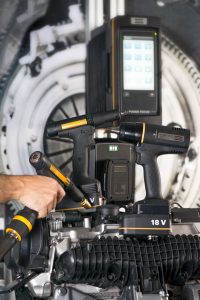Improving quality and efficiency whilst cutting costs with Smart Connected Assembly
In the fast-paced world of manufacturing, ensuring maximum efficiency and profitability by striking the right balance between quality and costs is certainly one of the biggest challenges facing producers, even more so with Brexit looming.
For Atlas Copco Tools & Industrial Assembly Solutions, supporting manufacturers through collaborative partnership is the bedrock of its business, which saw its centenary in the UK in 2019.
A leader in assembly tools and data driven services designed to add value to any production environment, from batch of one to high volume manufacturing, Atlas Copco continually takes the pulse of its core markets, through ongoing customer engagement.
The company has recently published a whitepaper, which identified that error-proofing in the production process remains a key issue for manufacturers. Based on field research from across Atlas Copco’s diverse and global customer base, it was found that manufacturers employing the company’s Smart Connected Assembly technology and process were tackling their challenges successfully.
One customer reported a reduction in rework of 15% by utilising Atlas Copco’s ‘Pick-to-Light’ system, which ensures operators pick the right parts at the right time in the assembly process, in order to mitigate production errors and costly line shutdowns.
Titled ‘Error-Proofing the Production Process’, Atlas Copco’s whitepaper introduces a range of measures to improve quality, efficiency and profitability, based around current and future production needs. The publication provides insights on how organisations can implement strategies to boost performance in relation to different levels of complexity in the assembly process. These are based around the principle of ‘Basic Needs’, ‘Complex Needs’ and ‘Very Complex Needs.’
Detailing Atlas Copco’s Seven Steps to Securing Product Quality as part of its Smart Connected Assembly philosophy, its report also illustrates a scalable and flexible roadmap to delivering the best achievable product quality. The sequential process integrates tooling and systems, which deliver both full traceability, as well as error-proofing protection, so that manufacturers have a complete understanding of the effectiveness of every stage of production.
Atlas Copco’s Seven Steps to Securing Product Quality:
Step 1: Classify Joints
Step 2: Introduce Torque Control
Step 3: Introduce Joint Control and Angle Monitoring
Step 4: Introduce Process Error-Proofing
Step 5: Introduce Reject Management and Part Control
Step 6: Secure Process Reliability
Step 7: Use of data for continuous improvement
Commenting on its research and whitepaper, Paul Clark, Business Line Manager for Atlas Copco Tools & Industrial Assembly Solutions, said: “Maintaining quality is an essential aspect of the assembly process, as both the direct and indirect cost for product quality issues can be immense. The demand for error proofing is high. When it comes to brand reputation, all the big manufacturers want to get it right first time, so error-proofing is now a core focus for manufacturers, regardless of their scale or the complexity of products. Our new whitepaper gives them an informative guide to the value of error-proofing that fits their current and future assembly needs.”
ADDING VALUE WITH SMART CONNECTED ASSEMBLY
Whilst a clear leader in supporting automotive manufacturing, Atlas Copco’s Smart Connected Assembly approach is being adopted by an increasingly diverse number of industries, from white goods and aerospace, to wind energy and agricultural applications.
Customers are seeing increasing complexity in their product mix and demands for higher quality, so the Smart Connected Assembly concept was designed to provide a clear return on investment by blending advanced tooling with data driven services and total customer back-up. This partnership approach towards zero defect assembly with full traceability enables companies to be more agile in dealing with international competition, globalization and new technologies.
From a product perspective, fully data integrated Low Reaction Tools are a key part of the company’s proposition to maximise assembly line productivity and efficiency, whilst reducing human error and ensuring operator safety.
By bringing together its Tools and Industrial Assembly Solutions divisions, Atlas Copco is now best placed to continue its journey as the manufacturing industry’s preferred joining partner.
To download Atlas Copco’s whitepaper, click here

















